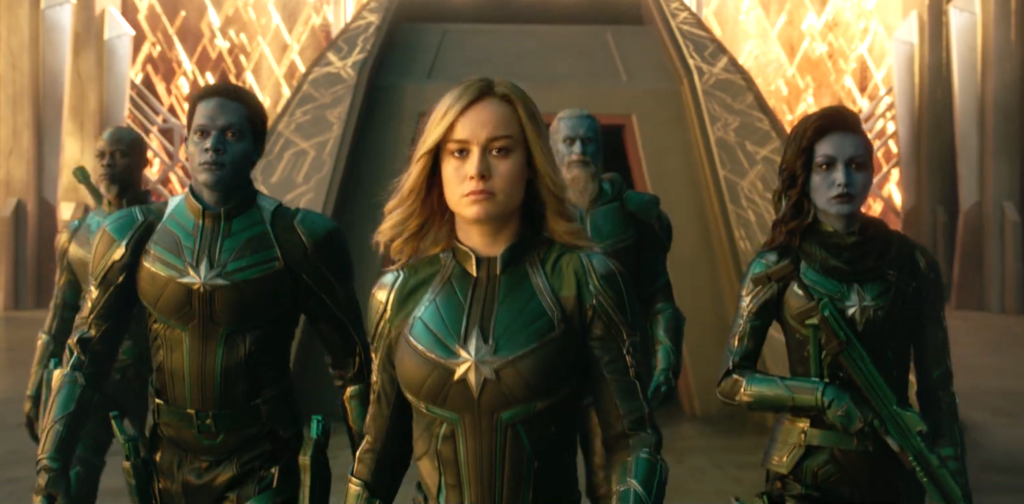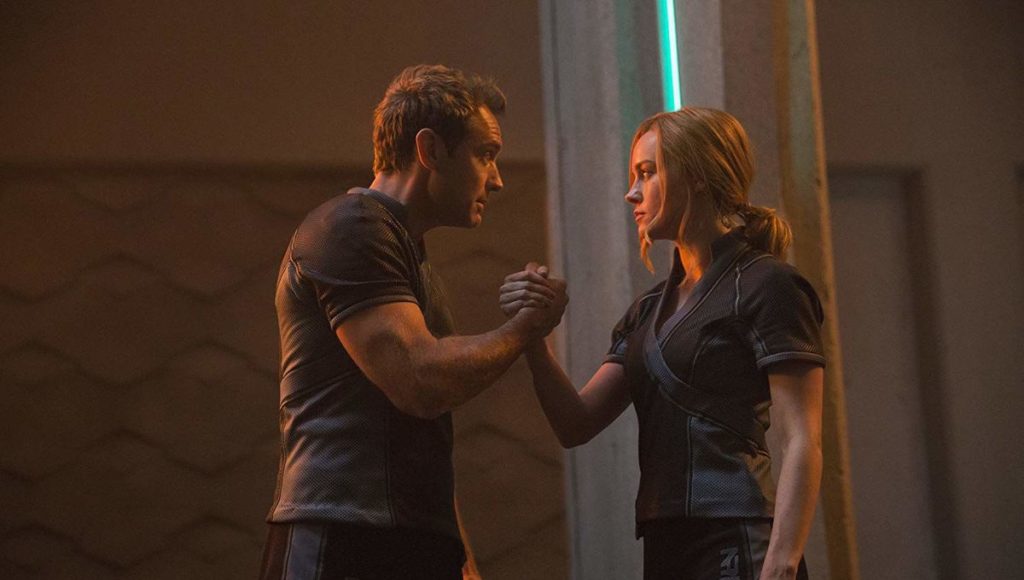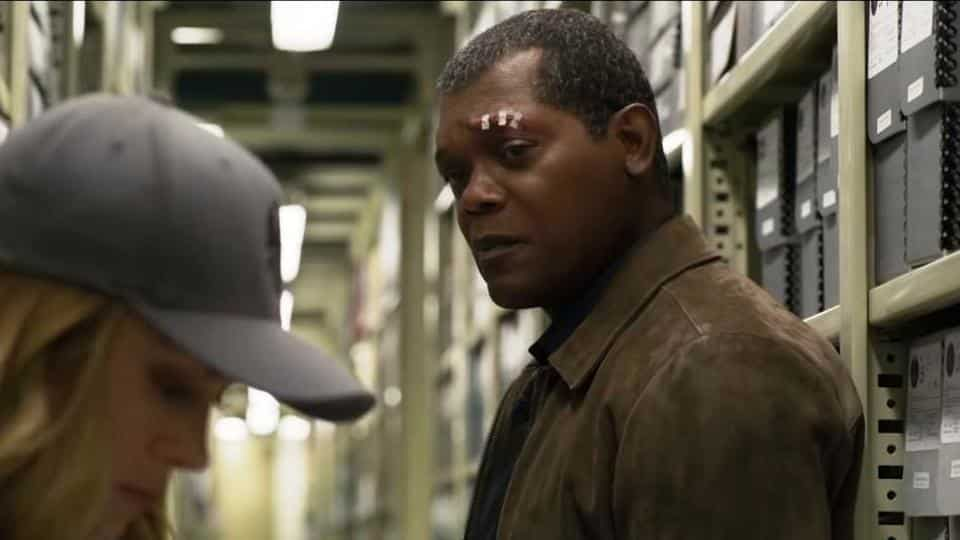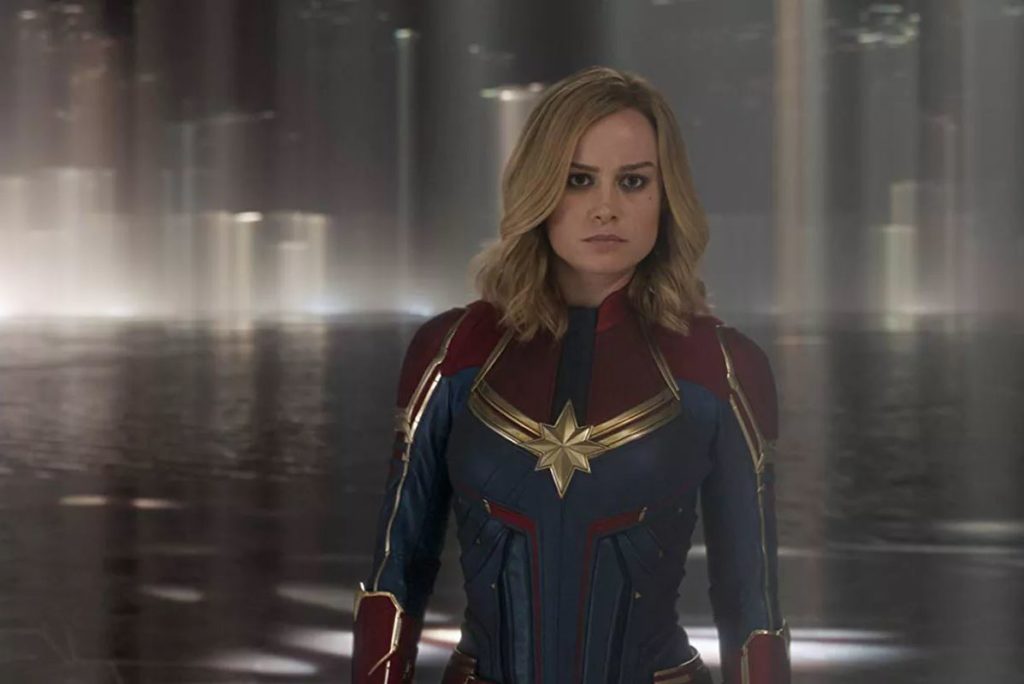
Trawling through the visualized memories of a warrior captive who’s suspended upside-down via electromagnets, the interrogator becomes baffled by the shapelessness of what he’s seeing. “Is anyone else confused?” asks Talos (Ben Mendelsohn), a member of a green-skinned, shape-shifting extraterrestrial species called the Skrulls. It’s a question that would ordinarily carry a meta charge; after all, this is the Marvel Cinematic Universe we’re talking about, that ginormous, globally branded franchise which has grown so sprawling, even those weaned on comics can barely navigate it without a map. Yet one of the satisfying things about Captain Marvel, the 21st and decidedly not-bad entry in the MCU proper, is that you don’t need to possess a doctorate in comic-book lore to appreciate its familiar origin-story rhythms. This isn’t to say that the movie skimps on fantastical elements or idiosyncratic detail; there are intergalactic wars, levitating soldiers, enigmatic androids, photon blasters, aptitude suppressors, and countless shots of characters manipulating or absorbing beams of glowing blue energy. But that’s all souped-up window dressing. At its core, Captain Marvel is about a hero grappling with her powers and struggling to claim her identity.
Directed by Anna Boden and Ryan Fleck from a script they wrote with Geneva Robertson-Dworet, Captain Marvel’s relative streamlining comes as something of a reprieve following the overstuffed Avengers: Infinity War. Where that bulky behemoth crammed countless characters and subplots into its 160-minute running time, this movie feels positively slender, with a refreshing clarity of focus. Sure, the obligatory mid-credits scene necessarily links what you just watched to the broader narrative of the MCU—a narrative that will theoretically conclude (ha!) next month with Avengers: Endgame—but otherwise, Boden and Fleck’s film features a welcome lack of duty-bound integration. Blessedly, Captain Marvel is about Captain Marvel.
You may already know her as Carol Danvers, but when we first meet her here, she’s called Vers (pronounced “veers”), and she’s a member of the Kree, a tribe of self-described “noble warrior heroes” who labor to prevent the Skrulls from invading various planets. (See, I promised you that there was plenty of stargazing fantasy to go around.) Played by Brie Larson with a sturdy combination of toughness and wit, Vers is plagued by troublesome dreams, ineffable visions of a clouded past. Her commander, a sort of alien sensei named Yon-Rogg (Jude Law, in a part not that far removed from his role as Natalie Portman’s predatory manager in Vox Lux), admonishes her to subdue her emotions, lest they interfere with her performance in combat missions. Those involve tactical raids against the Skrulls, who prove dangerous given their natural, T2-esque ability to imitate any being of their choosing.

The opening act of Captain Marvel, which follows Vers and Yon-Rogg on a perilous rescue operation, is by far its worst. Boden and Fleck have a steady hand with dialogue scenes—their prior credits include the acclaimed sports drama Sugar and the gambling two-hander Mississippi Grind—but their approach to superhero action is dispiritingly familiar and lackluster. There are lots of flashes of light and shots of characters running and jumping but never headed anywhere in particular. This is discouraging (if not exactly surprising), but what’s really grating about Captain Marvel’s extended prologue is its literal darkness; entire sequences are so dimly lit that you spend most of your time squinting to discern the image, a task made that much more difficult if you’re peering through 3-D glasses. Captain Marvel is designed to be a beacon of hope, but beacons aren’t supposed to be so hard to see.
Thankfully, Vers eventually gets separated and crash-lands on Earth—specifically into the middle of a Blockbuster store. Yes, the brunt of Captain Marvel takes place in 1995, which affords Boden and Fleck ample opportunity for winking references and playful nostalgia. Some of these gags are predictably groaning—behold my state-of-the-art messaging device, the pager!—but some are genuinely funny. And even if the directors don’t fully exploit its comic potential, the period setting—nearly a quarter-century removed from the present!—allows them to tap into a vein of lightness and humor, where they’re far more comfortable.

And at its heart (and like many MCU films), Captain Marvel—whose opening logo replaces the usual avenger-hopping montage with a touching tribute to the late Stan Lee—is less a superhero adventure than a mismatched buddy comedy. Shortly after her conspicuous arrival, Vers attracts the attention of Nick Fury, and if you somehow missed the earlier ’90s signifiers, you’ll surely comprehend the era once Samuel L. Jackson shows up with a digitally de-aged face and two functioning eyes. This is technically Jackson’s ninth appearance as Fury, but the franchise typically rolls him out to provide some high-cachet cameos, making this the first time since 2014’s Captain America: The Winter Solder that he’s had the occasion to deliver a real performance. As the movie appealingly tracks the evolving relationship between Vers and Fury—a camaraderie that starts out as antagonism, shifts slowly to mutual respect, then ultimately resembles something like loyalty—Larson and Jackson develop a winning comic chemistry of arched eyebrows, impish glances, and sardonic insults.
That isn’t unusual in the MCU, and while Captain Marvel is obviously notable for being the studio’s first release with a woman in the lead, it’s otherwise a thoroughly typical superhero film, exhibiting the genre’s standard strengths and flaws. The acting is uniformly solid (one upshot of running a multi-billion-dollar empire is that you can afford to hire top-tier talent); Larson ably shoulders the burden of stardom, nimbly handling her character’s solemn transition from Vers to Carol Danvers, while her supporting cast effortlessly steals laughs and scenes. (In addition to very fine performances from Jackson, Law, and Mendelsohn, Annette Bening lends her inveterate cool as a wise fighter pilot, further goosing the movie’s Top Gun vibes.) The dialogue is sharp and spry, the pacing is suitably brisk, and there are some nifty spaceships and special effects.
At the same time, Captain Marvel suffers from a certain formula, a safeness and sameness. The very existence of the planet may be threatened (again!), and there are the standard fake-outs concerning who exactly the real villains are, but even as bodies fly around and enemies issue dire threats, it’s difficult to perceive a real sense of stakes. This would be more forgivable if Boden and Fleck brought any panache to the set pieces, but with the exception of a dynamic sequence set in, around, and on top of a train—which pays homage to The French Connection, and which features Vers getting into an enjoyably scrappy brawl with a senior citizen—all of the action here feels entirely recycled. And while there are some very funny moments involving a feline with a deceptively voracious appetite, it’s hardly encouraging when a superhero film’s most memorable moments revolve around a cuddly cat.

This doesn’t make Captain Marvel a bad movie. It’s fine. But its competence lacks the flourishes of personality that elevate the MCU’s better installments: the vibrant verbal sparring of Thor: Ragnarok, the aesthetic grandeur of Doctor Strange, the giddy exoticism of Guardians of the Galaxy, the dynamic action of Ant-Man and the Wasp, the complex villainy of Black Panther, the motormouthed energy of the Iron Man films, the creeping paranoia of the Captain American sequels. (In case it wasn’t clear, there are a lot of MCU movies, and a bunch of them are actually pretty good.)
Only once does Captain Marvel showcase some genuine flair: a flashback montage that stitches together scenes from Carol’s past, watching in silent triumph as she defiantly rises from the ground again and again. It may be goofy and syrupy, but it’s also deeply moving; in these slow-motion images, the film communicates its message of feminine empowerment more effectively than any grandiose speech ever could.
Otherwise, Boden and Fleck seem content to be helming an avenge-by-numbers blockbuster, perhaps operating under the assumption that making a movie about a female superhero relieved them of the need to make said superhero movie legitimately fun or interesting. I don’t mean to dismiss their achievement; they’ve finally shattered the glass ceiling in the MCU, and that means something. But the artistic ceiling—the built-in challenges and limitations that cap the entertainment potential of any assembly-line franchise production—proves harder to crack.
Grade: B-
Jeremy Beck is the editor-in-chief of MovieManifesto. He watches more movies and television than he probably should.
